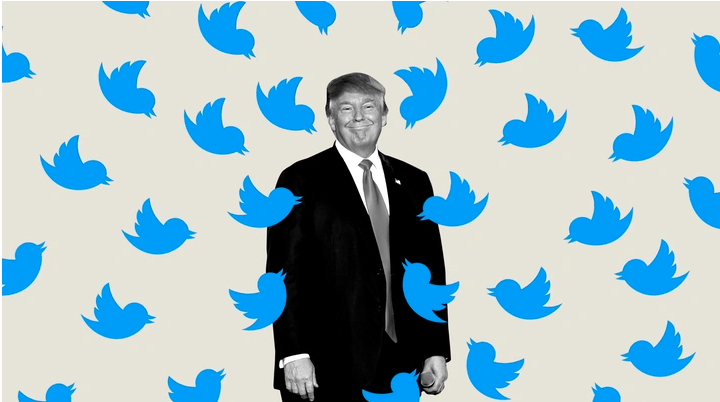The Argument of Mass Media’s Involvement in Politics
Since the events that occurred at the Capitol, Twitter has been getting praise and backlash. Take a look at the argument on both sides.
January 29, 2021
The First Amendment right states that in the United States of America, people have the right to freedom of speech. Lately, there has been a debate about how far this freedom will go after former President Donald Trump was permanently banned from many social media platforms.
On Wednesday, January 6, Trump exercised his right to the First Amendment before the Pro-Trump events outside of the Capitol in Washington D.C. “We’re going to have to fight much harder,” he said at his ‘Save America Rally.’
As a result of his speech, thousands walked to the Capitol to protest the results of the election. It wasn’t until a few hours later where rioters began fumbling with cops, and the historic riot began.
After the riot passed, prominent Democrats called for the Articles of Impeachment and for former Vice President Mike Pence to invoke the 25th amendment, claiming that Trump incited the violence.Large social networks began to ask the question, what can they do to prevent more violence? The answer then became clear when Trump’s presence in social media disappeared in only a few days. He was banned from many social platforms like Twitch, Facebook, Snapchat, YouTube, and Twitter.
Furthermore, Parler, a popular app that is similar to Twitter, was recently taken off of the app store and refused service by Amazon. Parler acted as a place for conservatives to freely voice their opinions without the risk of getting censored.
Both sides, Republicans and Democrats, have strong opinions regarding his ban. In this article, we take a look at both sides of the issue.
For Trump’s Ban
After four years of Donald Trump’s infamous tweets, he has been banned from the platform. Many view the actions taken by social media as the correct thing to do and even argue further that Trump deserved to get removed from office. This begs the question, is Twitter’s ban a violation of free speech?
Andrew Geronimo, director of the First Amendment Clinic at Case Western Reserve law school, explained, “Some argue that certain websites have gotten so large that they’ve become the de facto ‘public square’ and thus should be held to the First Amendment’s speech-protective standards.” However, even though social media resembles the public square space, the social platforms are considered private businesses. “The First Amendment constrains government power, so when private, non-governmental actors take steps to censor speech, those actions are not subject to constitutional constraints,” Geronimo continued.
In Twitter’s personal statement regarding Trump’s ban, they state, “After close review of recent Tweets from the @realDonaldTrump account and the context around them — specifically how they are being received and interpreted on and off Twitter — we have permanently suspended the account due to the risk of further incitement of violence.”
Further on in their statement, they state their reasons being: Trump’s statement that he will not be attending the Inauguration is being interpreted as confirmation of an illegitimate election, calling rioters at the U.S Capitol ‘American Patriots’, and allegedly inciting the violence that occurred at the Capitol.
“It took blood & glass in the halls of Congress – and a change in the political winds – for the most powerful tech companies to recognize, at the last possible moment, the threat of Trump,” tweeted Senator Richard Blumenthal, from Connecticut.
Against Trump’s Ban
Many conservatives argue that Trump and Parler’s ban is unconstitutional and that Trump’s ban wasn’t just to prevent further incitement but a way of censorship.
When the Associated Press declared Joe Biden the Presidential elect, social media such as Tik Tok, Instagram and Twitter began putting false information warnings on posts regarding election fraud. Now with Parler off of most app stores, limiting conservative’s free speech even more. “It started way before Trump’s Twitter ban. They have been shadow banning conservatives for quite some time and making sure their ideas don’t spread,” said former Saugus student and conservative influencer Kaylee Stockton.
The German chancellor, Angela Merkel – known to be reluctant in embracing Trump’s presidency– clearly stated that the Twitter ban was “problematic.”
In the U.S, social media platforms are traditionally left to police their own sites, though lately, much controversy has gathered behind this regarding political beliefs. According to the Financial Times, “Ms. Merkel said through her spokesman that the U.S government should follow Germany’s lead in adopting laws that restrict online incitement, rather than leaving it up to platforms such as Twitter and Facebook to make up their own rules.”
Her spokesperson, Steffen Seibert, called freedom of speech “a fundamental right of elementary significance.”
“Trump was in no way responsible for what happened at the Capitol, nor did he ever condone it. He actually condemned it on multiple occasions. If you ban the leader of the free world, where does the censorship end?” said Stockton.

